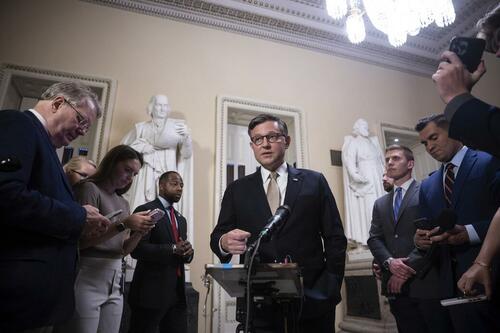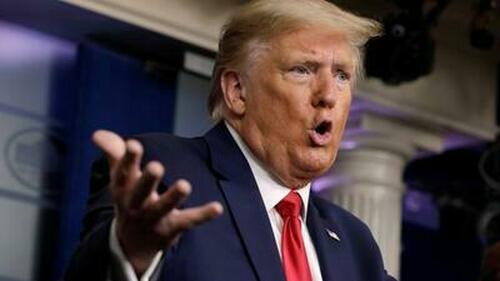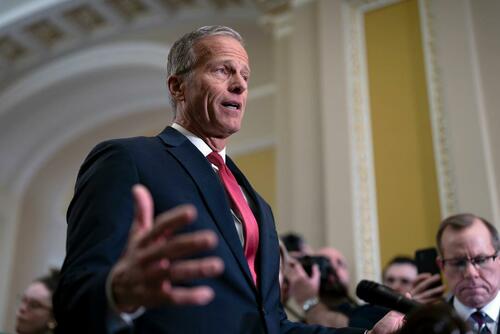
Johnson, Thune, and Trump On Collision Course Over Approaching Shutdown
With just under a month until the next government shutdown (sigh), Republicans are locked in an increasingly messy internal battle over how to keep federal agencies funded, as competing strategies in the House, Senate, and White House collide over spending priorities, foreign aid, and political leverage.

Congress has until Sept. 30 to pass new legislation to avoid a lapse in funding, but the GOP – which controls the White House, House, and Senate – remains fractured on a path forward. This isn’t just about keeping the lights on, but also the balance of power within the Republican Party itself, as President Donald Trump’s latest move to rescind nearly $5 billion in foreign aid has inflamed tensions within the Senate and complicated delicate negotiations, Punchbowl News reports.
Three Strategies, One Deadline (and no cup)
While Republicans control all levers of government, they are far from unified:
-
Senate Republicans, led by Majority Leader John Thune (R-SD), are pushing for bipartisan funding bills that exceed House and White House proposals by tens of billions of dollars. Thune wants to position Senate Republicans as willing partners on funding, betting he can portray Democrats as obstructionists if they refuse to cooperate.
-
House Republicans, under Speaker Mike Johnson (R-LA), are leaning toward a short-term continuing resolution (CR) to keep the government open through mid-November, buying time for broader talks on full-year appropriations.
-
The White House, meanwhile, prefers a longer stopgap that would fund the government until at least the first quarter of 2026 – avoiding repeated shutdown showdowns but angering hard-line conservatives who see it as a capitulation to Democrats.
This divide sets up a high-stakes battle within the GOP and against Democrats, with each faction maneuvering to avoid taking the blame if the government shutters.
Trump’s Pocket Rescission Sparks Backlash
Fueling the chaos is President Trump’s decision to issue a „pocket rescission” canceling nearly $5 billion in congressionally approved foreign aid, a move that has enraged Senate Democrats and rattled some top Republicans.
Sen. Susan Collins (R-ME), chair of the Senate Appropriations Committee, called the maneuver 'flat-out illegal’ and said her counsel is reviewing potential legal challenges. Sen. Mike Rounds (R-SD) warned the move could derail bipartisan negotiations:
“I think it can give Democrats a reason not to work with us on a bipartisan appropriations bill. That’s got me concerned,” Rounds said.
Making the rescission issue extra spicy; the Senate is preparing to mark up the State Department–Foreign Operations funding bill next week – one of the very accounts targeted by Trump’s cuts. With immigration and border security funding also in the mix, appropriators face an increasingly combustible set of issues.
Johnson Balances a Razor-Thin Majority
Speaker Johnson is under pressure from both establishment Republicans and the hard-right Freedom Caucus as he tries to corral votes for any funding deal.
House Appropriations Chair Tom Cole (R-OK) supports a short-term CR into late November, tied to a handful of full-year funding bills, which would include spending for Veterans Affairs, Agriculture, and the Legislative Branch, leaving continuing negotiations over the remaining appropriations.
But conservatives are pushing back hard, The Hill notes:
-
Rep. Scott Perry (R-PA), former chair of the Freedom Caucus, insists on a one-year CR with automatic spending cuts:
“I’m not interested in anything that gets us right before the holidays, because we all know exactly how that’s going to go.”
-
Rep. Andy Harris (R-MD), current Freedom Caucus chair, echoed that sentiment, saying if Congress is going to extend funding into 2026, “I say just go for it and put it into next December.”
-
Rep. Eric Burlison (R-MO) warned he would “probably not” vote for any short-term deal if it’s loaded with community funding projects, aka 'earmarks,’ while other Republicans want those local funding boosts included.
For Thune, the goal is to protect the Senate’s bipartisan traditions and keep Democrats at the table. He believes moving regular appropriations bills, even at higher spending levels than Trump’s budget — will put political pressure on Senate Majority Leader Chuck Schumer (D-NY) and his caucus.
“If the Democrats are interested in funding the government, we’re going to give them every opportunity to do that,” Thune told Punchbowl, promising to bring more funding bills to the floor this month.
However, the rescission fight threatens to blow up that strategy. Collins’ criticism signals a rare Republican split in the Senate, while Democrats, furious over Trump’s foreign aid cuts, may be less inclined to cooperate on Thune’s bipartisan path.
Democrats Hold Their Fire – For Now
Despite frustration with Trump’s rescission, some Democrats are signaling support for pairing a short-term CR with several full-year appropriations bills to avoid a shutdown.
Sen. Patty Murray (D-WA), top Democrat on the Appropriations Committee, said she supports attaching three bipartisan bills; for Veterans Affairs, Agriculture, and the Legislative Branch, to a short-term deal:
“As part of a bipartisan, short-term CR, I support conferencing those three bills and passing them with a short-term CR for the remaining nine bills,” Murray said.
The White House has also struck a cautiously conciliatory tone, acknowledging that a short-term CR is “increasing in likelihood” but continuing to press for a longer solution that avoids repeated deadlines.
Tyler Durden
Wed, 09/03/2025 – 21:20

 2 miesięcy temu
2 miesięcy temu






![Ślubowanie kadetów i nowa strzelnica w Zespole Szkół numer 5 w Rybniku [FOTO]](https://www.naszrybnik.com/photos/176393477557-908806-.jpg)







